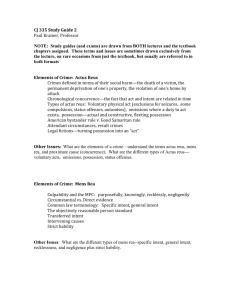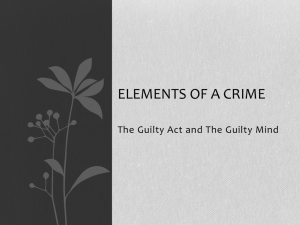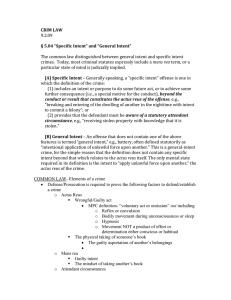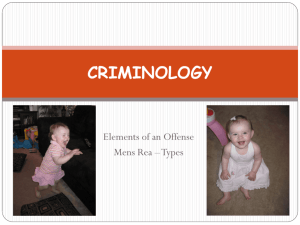Elements of an Offence
advertisement
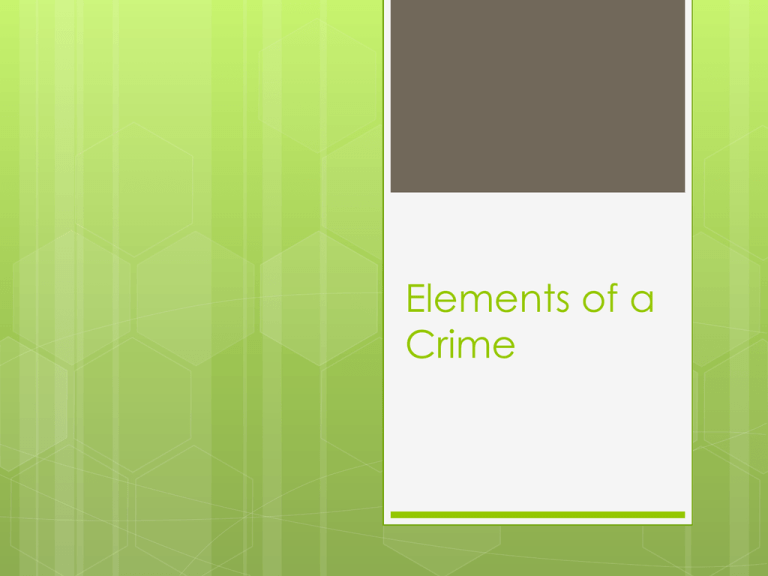
Elements of a Crime Learning Goal: By the end of this lessons, I will be able to accurately define and identify the essential elements of a criminal offence. Elements of an offence To obtain a conviction the crown must be able to prove beyond a reasonable doubt that each and every element of the offence with which the accused is charged was in fact committed by the accused. Elements of a Crime Criminal offences are made up of two basic elements: 1. 2. ACTUS REUS – the prohibited act MENS REA – criminal intent Actus Reus Physical conduct of the accused Act or failure to act that has been identified by Parliament as harmful Most offences contained in the Criminal Code specify the wrongful action exist Actus Reus Example: Criminal Code s.222(1) “ a person commits homicide when directly or indirectly by any means he causes the death of a human being.” The actus reus in this case is “causing the death of a human being” Actus Reus Some offences, the actus reus can result from failure to do something “to withhold necessities from someone your legally obligated to provide for” Other offences require only a certain state of being Possession of break-in instruments Mens Rea Involves the mental state of the accused Latin phrase: an act does not become guilty unless the mind is guilty The mens rea of a Criminal offence is the mental element that accompanies the commission of the actus reus. The crown must be able to prove beyond a reasonable doubt that the accused was of a guilty mind at the time the crime was committed Mens Rea The mental state required for mens rea to exist falls into two possible categories 1. Intent or Knowledge 2. Recklessness Men Rea The law considers some people to be incapable of forming the intent necessary to commit a wrongful action: 1. Those suffering from a mental disorder 2. Minors, or infants- under the age of 12 3. Those under the influence of drugs or alcohol to such an extent that they do not understand the nature of their actions The Criminal Equation Actus Reus + Mens Rea = Crime Defining Crime Worksheet Intent Intent means… He/she means to do something wrong Knows or should have foreseen the results of the wrongful act General Intent a person commits a wrongful act for its own sake, without an ulterior motive or purpose Example: theft easier to prove than specific intent Specific Intent when someone commits one wrongful act for the sake of accomplishing another Example: shooting the store clerk during a robbery To prove Mens rea to commit robbery, the Crown has to show not only that he/she shot the victim (general intent) but that he/she did so with the specific intent of stealing from the victim Subjective Intent Concerns the accuser’s state of mind at the time of commission of the guilty act Focuses on the actual knowledge of the individual accused In such cases, only the accuser’s actual intention or knowledge of the effects of his or her conduct or the facts surrounding it is relevant Subjective Intent: Knowledge In order to have the mens rea to commit a crime, the courts assume a person must have some knowledge of the actus reus of the crime This is sometime indicated by the words “knowing” or “knowingly” in the definition of the crime Subjective Intent: Knowledge S. 251 (1) Every one who knowingly (b) sends an aircraft on a flight or operates an aircraft that is not fit and safe for slightly…if guilty of an indictable offence… The Crown has to prove the accused knew the aircraft was not fit and safe for a flight Subjective Intent: Willfully S. 319 (2) Every one who by communicating statements, other than in private conversation, willfully promotes hatred against any identifiable group is guilty of A) an indictable offence and is liable to imprisonment for a term not exceeding two years;…. Objective Intent Involves determining what a reasonable person would have understood, perceived or foreseen in the circumstances Less concerned with the actual knowledge of the accused The accused was not acting reasonably Objective Intent: Criminal Negligence Criminal Negligence: Proving that the accused showed negligence which means the accused failed, under certain circumstances to take precautions that an reasonable person would take to avoid causing harm to another Objective Intent: Recklessness A person is said to be reckless when s/he is extremely careless or heedless of apparent danger S/he understands the real risk of such consequences and persists or is reckless in the conduct anyway s/he will be deemed to have the subject intent necessary for criminal liability Objective Intent: Recklessness S. 219 (1) Everyone is criminally negligent who (a) is doing anything, or (b) in omitting to do anything that is his duty to do, show wanton or reckless disregard for the lives and safety of other persons Crown must show Accused was aware of the danger involved Even if s/he did not intend the consequence Objective Intent: Willful Blindness Is related to recklessness Involves deliberately closing you mind to the possible consequences of your actions When s/he suspects a harmful or criminal outcome but prefers not to ask the questions that would confirm these suspicions Ex. http://www.youtube.com/watch?v=U1o3BiO cq8A Difference between Subjective and Objective Intent Subjective: focuses on the actual knowledge if the individual is accused Objective: less concerned with actual knowledge of the accused Accused not acting reasonably Example R v. Lamb Larry Lamb was a young man who owned a revolver that had a five chambered cylinder that rotated clockwise each time the trigger was pulled. Lamb, jokingly, pointed the revolver at his best friend, and pulled the trigger, knowing that the two chambers were empty. However when Lamb pulled the trigger the chamber rotated and he shot his best friend. He died. Did Lamb subjectively intend to cause death? If no, does that mean that Lamb is blameless for his friends death? Practice Bernice, a 6 year old was playing with her father’s rifle and killed her friend, Jack Sergia, while hunting with some friends was aiming at a deer and accidentally shot another hunter, Jeff Lucio, who escaped from a psychiatric institution, shot and killed his wife Review ACTUS MENS REUS--- THE ACT REA- MENTAL STATE (Intent) The Criminal Equation Actus Reus + Voluntary or Conscience act or omission Mens Rea = CRIME intention knowing willful reckless careless Case Study It is an offence under environmental protection legislation to discharge pollutants into a waterway. The Crown can prove that Company X discharged pollutants into the Grand River (actus reus). What is the mens rea that the Crown must prove in this case?
